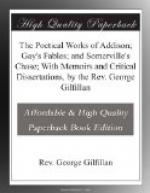“I wish your bards would sing it rather better.”
They bethought themselves of Addison, and sent Boyle to request him to write some verses on the subject. He readily undertook the task, and when he had half-finished the “Campaign,” he shewed it to Godolphin, who was delighted, especially with the Angel, and in gratitude, instantly appointed the lucky poet to a commissionership worth about L200 a-year, and assured him that this was only a foretaste of greater favours to come. The poem soon after appeared. It was received with acclamation, and Addison felt that his fortune and his fame were both secured.
Yet, in truth, the “Campaign” is not a great poem, nor, properly speaking, if we except the Angel, a poem at all. It is simply a Gazette done into tolerable rhyme; and its chief inspiration comes from its zealous party-feeling. Marlborough, though a first-rate marshal, was not a great man, not by any means so great as Wellington, far less as Napoleon; and how can a heroic poem be written without a hero? Yet the poem fell in with the humour of the times, and was cried up as though it had been another book of the Iliad. Shortly afterwards he published his “Travels,” which were thought rather cold and classical. To them succeeded the opera of “Rosamond,” which, being ill-set to music, failed on the stage; but became, and is still, a favourite in the closet. It is in the lightest and easiest style of Dryden,—that in which he wrote “Alexander’s Feast,” and some other of his lyrics,—but is sustained for some fifteen hundred lines with an energy and a grace which we doubt if even Dryden could have equalled. Its verses not only move but dance. The spirit is genial and sunny, and above the mazy motions shines the light of genuine poetry. Johnson truly says, that if Addison had cultivated this style he would have excelled.
From the date of the “Campaign,” Addison’s life became an ascending scale of promotion. We find him first in Hanover with Lord Halifax, then appointed under-secretary to Sir Charles Hodges, and in a few months after to the Earl of Sunderland. In 1708 he was elected member for Malmesbury, and the next year he accompanied Thomas, Earl of Wharton, Lord-Lieutenant of Ireland, to that country as his secretary, and became Keeper of the Records in Birmingham’s Tower,—a nominal office worth L300 a-year. His secretary’s salary was L2000 per annum.
Previous to this he had resumed his intimacy with Steele, to whom he lent money, and on one occasion is said to have recovered it by sending a bailiff to his house. This has been called heartless conduct, but the probability is that Addison was provoked by the extravagant use made of the loan by his reckless friend. In Parliament it is well-known Addison never spoke; but he surrounded himself in private life with a parliament of his own, and, like Cato, gave his little senate laws. That senate consisted of Steele, Ambrose, Phillips; the wretched Eustace




